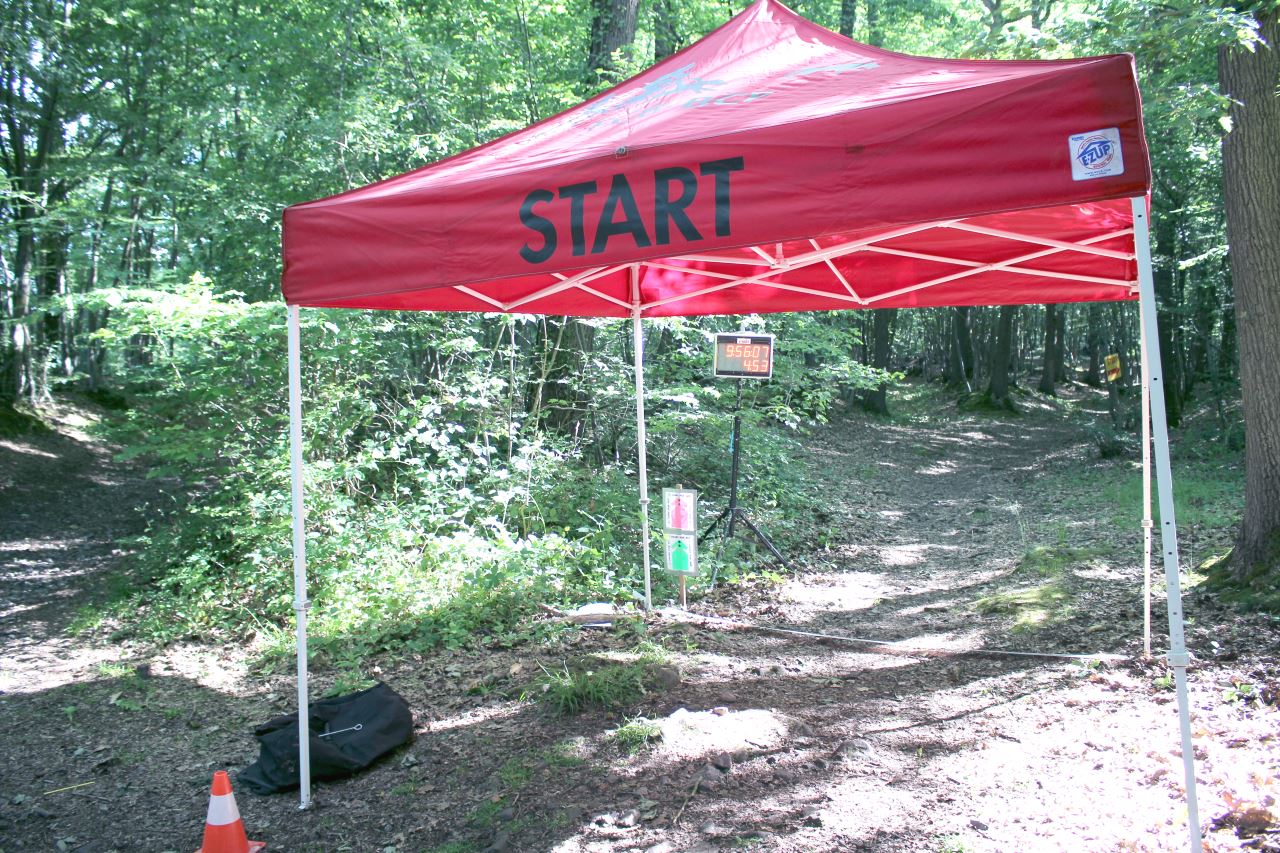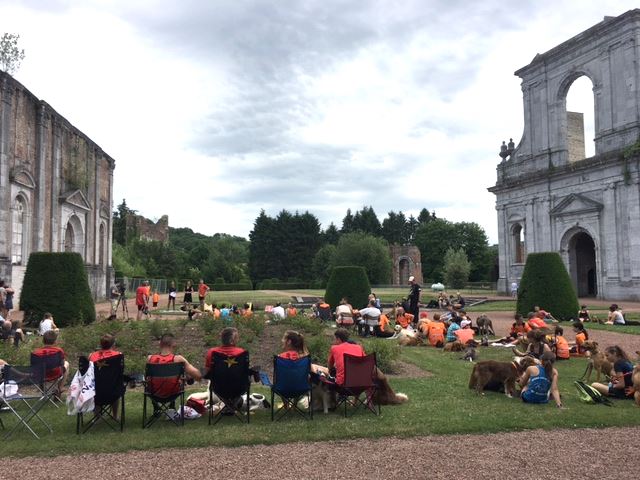On June 11th, the FCI was the friendly partner to the very first
canicross edition
in the beautiful setting of the Aulne Abbey. The City of Thuin was also involved
in the incentive in the frame of the events that now punctuate the Thuin, World
Capital of Dogs illustrative calendar –a designation that has started to make
itself
a reputation, which is a great delight to us all!
No fewer than 200 participants –and their dogs, of course– reported at the start
in order to compete in the canicross disciplines in a spirit of good sportsmanship.
What are the contests’ practical details?*
Age categories and distances
U7 (under 7, or “poussins”): no timing, no ranking, just fun ;-)
U11 (7 to 10, or “minimes”): run between 1 and 2 km. Each U11 may run with an adult.
U14 (11 to 14, or “cadets”): run between 2.5 and 3 km
U18 (15 to 18, or “juniors”): take the adult track
Seniors: between 19 and 39years old
Veterans I: between 40 and 49 years old
Veterans II: from 50 years old |
} |
Long (between 5 and 8 km) or short (between 2.5 and 3 km) tracks |
Juniors and adults may choose to run either the long or the short track, or both.
Start
Grouped in line or in individual time-trial (the latter every 30 seconds, in bib
number order, or every minute in kid categories).
International competitions
The first Canicross European Cup took place in Malonne, Belgium, in 1998. This
year’s edition will hold in Piémont, Italy, from October 12th to October
15th.
Are there “canicross dogs”?
“You run with your dog, the dog you love! All breeds are allowed in,” Jean-Pierre
Talbot says; however, “while all dogs are accepted, not all breeds are suited. You
can run with a small Jack Russell, but not with a Chihuahua or a Bulldog”.
The dog must be at least twelve months old (18 in bike-jöring). The secret lies
in the human-dog adequacy in terms of capacities adjustment and exercise capability.
The background*...
We are in 1982. Together with a set of workmates, Gilles Pernoud, a young
veterinary
student, is looking for some innovative process to help dog owners enhance their
dogs’ socialisation. These vets-to-be are sportsmen, so they think up a race with
dogs, a dog-cross. They name the new activity “Cross canin” or “Canicross”. A first
canicross incentive is then organised in Paris by the veterinarians union, which
exclusively banks on the educational aspect, totally disregarding the sporting side
of the thing. The competitors make a mass start. Some walk, some jog, and a few
even run. But no specific hardware is used, since it doesn’t exist yet: the lead
is connected to the collar and hand-held.
Gilles Pernoud then attends courses at the Veterinary School in Lyon. The veterinarians
union repeats the “canicross” experience in 1984, this time in Lyon, yet
still by
the same educational token: a simple walk with one’s dog and its integration in
an urban setting. This time, the competitors run more than they walk. Under Gilles
Pernoud’s continuing impulse, the activity really takes off in 1986, with
the creation
of “Veto Racing”. It should be noted that the veterinarians’ union is not involved
anymore; Veto Racing is autonomous and organises a genuine canicross close to the
Veterinarian School of Lyon, in the Lacroix de Laval Estate Park. This time, the
sledge dog equipment manufacturer “Gens de la Montagne” is present and offers his
harnesses for sale. For humans, he proposes some sort of belt that was designed
for the purpose.
On July, 14th 1986, the event takes place in Saint Pierre d'Allevard (near
Grenoble).
Now, things are well on the way : the competitors do run, and rules are applied,
that guarantee respect for the dogs.
Canicross is...
- two partners who build a team and enjoy running together
- shared efforts
- a team during exertion, of course, but also before (training, preparation,
education, socialisation…) and after effort (resting, congratulations, rewarding...)
The atmosphere was very energetic and synergetic. While we have lots of opportunities
to witness the incomparable bond that forms between man and dog, it is no
overstatement
to say that in the course of this activity, one is close to seeing it form right
before your eyes!
The Aulne Abbey area definitely was bustling on this beautiful Sunday in June: in
addition to the usual strollers, fonder than ever of the beautiful setting when
the sun shows up, the canicross competitors and their supporters, together with
all the dogs that form their respective families, made the most of the day and of
the show given by all the athletes: runners and mountain biker, on two feet or four
paws ;-)
And if you and your dog do not feel you can run the expected canicross distances,
you can always turn to caniwalk! The benefits are the same: a privileged relationship
with your four-legged friends, a positive impact on your health and on theirs, an
easy practice, whether in the city or in the country; in a word... Why wait?!
© Marie Luna Durán

© Marie Luna Durán

© Marie Luna Durán

© Marie Luna Durán

© Marie Luna Durán

© Marie Luna Durán

© Marie Luna Durán

© Marie Luna Durán

© Marie Luna Durán

© Marie Luna Durán

© Marie Luna Durán

© Marie Luna Durán

© Marie Luna Durán

© Marie Luna Durán

© Yves De Clercq

© Yves De Clercq

* Canicross, bike-jöring : mode d’emploi, par Jean-Pierre Talbot
Marie Luna Durán
FCI Marketing and Public Relations Manager